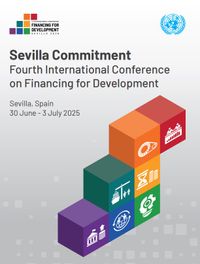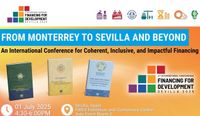UN Summit on Financing for Development (FFD4) in Sevilla
HOW MUCH COMMITMENT IN THE SEVILLA COMMITMENT?
The state of consensus in 2025 and the future of work on Financing for Development
From June 30 to July 3, the United Nations and the Government of Spain hosted the Fourth International Conference on Financing for Development in Seville, bringing together all the world’s governments except one, the United States. Also participating were representatives of the world’s major international public development, trade and financial organizations and forums, international business associations, internationally active private financial institutions, and civil society organizations. In all, over 15,000 people were said to have attended, including nearly 50 heads of state or government. There were more than 470 “special” and “side” events, plus formal “roundtables” and plenary speeches, as well as an international business forum, an “SDG Investment Fair” where governments could pitch opportunities to investors, as well as a civil society forum and a feminist forum.
The summit ended with a compromise document, The Seville Commitment,
see also at (https://financing.desa.un.org/sites/default/files/2025-07/FFD4%20Outcome%20Booklet%20v4_EN%20-%20spread.pdf) .
Barry Herman wrote an analysis and assessment of the summit results of the Sevilla Commitment, see here >>>
In addition agreements were reached in Seville on about 130 initiatives at the “FFD4 Sevilla Platform for Action Initiatives" by groups of willing governments to support economic and social development. See at https://financing.desa.un.org/sites/default/files/ffd4-documents/2025/FFD4%20SEVILLA%20PLATFORM%20FOR%20ACTION%20INITIATIVES_Full%20List%20_0.pdf
B. Herman assisted UN DESA in organizing a high-profile FfD4 Special Event "From Monterrey to Sevilla and Beyond" on July 1 with diplomats and participation of the World Council of Churches (WCC) on the current situation of development financing. The event examined the processes leading to, and key outcomes of past FFD conferences—from Monterrey Consensus (2002) to Doha Declaration (2008) and the Addis Ababa Action Agenda (2015)—to identify how the international community can leverage FFD post-Sevilla to achieve the global commitment to finance sustainable development.
Speakers were:
• H.E. Ms. Merete Fjeld Brattested, Permanent Representative of Norway to the United Nations and Co-Facilitator for the Sevilla Commitment, outcome document of FFD4
• H.E. Mr. Mauricio Escanero, Former Facilitator of the Monterrey Consensus and Ambassador of Mexico to Israel
• H.E. Mr. Samuel Isa Chala, Deputy Permanent Representative, Permanent Mission of Ethiopia to the United Nations
• Prof. Jose Antonio Ocampo, Member of the International Commission of Experts on FFD, former Minister of Finance, Colombia and former United Nations Under Secretary General for Economic and Social Affairs (tbc)
• Prof. Eduardo Gálvez, Former Lead Negotiator of the Monterrey Consensus as Coordinator of the G77 and China
• Ms. Marilou Uy, former Director of the Secretariat of the Intergovernmental Group of Twenty-Four on International Monetary Affairs and Development (G-24), Member of the Independent High Level Expert Group on Climate Finance and Member of the Jubilee Commission of Experts to address Debt and Development Crises
• Rev. Jackline Makena Mutuma (Kenya), World Council of Churches
Recording of the Special Session is available on UN Web TV at https://webtv.un.org/en/asset/k10/k10437766p ;
Session begins at 5:51 (5 hours, 51 minutes into the recording of all the sessions that day) and lasts until the end.
The event was also reported on the website of the World Council of Churches: “The World Council of Churches (WCC) brought faith-based perspectives to the Fourth International Conference on Financing for Development, a major United Nations meeting held in Seville, Spain. The conference brings together world leaders to discuss how to fund global development goals, including fighting poverty and climate change”.
--------------------
Prospects and Priorities for the Fourth International Conference on Financing for Development
Despite the reforms undertaken since the pandemic, there is need for further reform of how the rising sovereign debt crises are resolved. In most of our countries today, there is a national and an international challenge for the economy.
At country level: the challenge is to make the needs of poor and working people count more in economic policymaking. This means adopting economic policies that deliver good jobs, provide rising incomes, and deliver environmentally and financially sustainable production; it also entails the rich paying their fair share for essential public goods and services through progressive taxation. Unfortunately, the political power of wealth and international pressure, as from the International Monetary Fund (IMF), have made for unfair fights over national budgets. But these circumstances necessarily require domestic political struggle.
At international level: In some international policy realms, the challenge is to build inter-governmental alliances and partnerships that will address specific needs, as in international trade and investment policy. Countries just have to look more intensively at deepening cooperation among neighbours or like-minded partners. In other policy areas, however, only global action is meaningful, as in pandemic prevention or addressing global warming or managing global financial relationships. In those cases, the effort must be to somehow fix the fractures.
All of this has implications for what may be achieved at the 4th International Conference on Financing for Development (FfD4), which will be hosted by the United Nations at the end of June in Sevilla, Spain. FfD conferences are unique among intergovernmental conferences in that, while hosted by the United Nations, they have intimately involved the IMF, the World Bank and the World Trade Organization, along with other international economic and financial bodies. They have thus been opportunities to integrate and politically strengthen different specialized economic and financial policy discussions. While some of those discussions take place under the UN symbol, most of them are undertaken elsewhere in narrower trade, financial and other forums. The objective is that, taken together, the policies in an FfD outcome document should form a coherent package for a holistic agenda that promotes what we today call “sustainable development” and its 17 sustainable development goals (SDGs). See full paper here >>>
---------------
The Global Summit on Financing for Development (FFD4) 2025 should be a Success
The process to prepare for the fourth International Conference on Financing for Development next June 2025 in Seville, Spain is entering an important stage. However, it does not seem that there are enough opportunities for substantive discussions of policy matters and so the conference could end up without any new agreements to celebrate. See information about the International Summit (FfD4) in Seville here >>>
See detailed information on roadmap for the Summit and history of the "Financing Sustainable Development" (FfD) process here >>>
----------------
Entwicklungsfinanzierung in Zeiten multipler Krisen
by Eva Hanfstaengl
Nach ersten Erfolgen der Umsetzung der 17 UN Entwicklungsziele (SDGs) führen die Folgen des Klimawandels, die Auswirkungen von Corona, der Krieg in der Ukraine, Lebensmittel- und Energiekrise, die Unterbrechung von Lieferketten und Lieferengpässe sowie Inflation und weltweit gestiegene Zinssätze wieder zu einem Anstieg von Armut. Allein im Jahr 2022 hat die Zahl der Menschen, die in extremer Armut leben, um 11 Mio. zugenommen. Nach Prognosen der Weltbank werden im Jahr 2030 noch 574 Millionen Menschen in extremer Armut leben, also mit weniger als 2,15 Dollar pro Tag auskommen müssen. Die Chancen für das Erreichen der Entwicklungsziele sind gering.
Etwas Hoffnung bringt der Beschluss der Generalversammlung der Vereinten Nationen im Dez. 2023 zur Einberufung einer 4. Internationalen Konferenz über Entwicklungsfinanzierung (FfD4) im Jahr 2025, an der Regierungsvertreter, Internationale Finanzinstitutionen, Business und Zivilgesellschaft gemeinsam nach Lösungen suchen sollen. In einem herausfordernden wirtschafts- und geopolitischen Umfeld werden hohe Erwartungen an die Konferenz gestellt. Einerseits sollen Mittel und Wege gefunden werden, zusätzliche Gelder zu mobilisieren, um die gewaltige Finanzierungslücken bei Klima und Entwicklung zumindest signifikant zu reduzieren. Andererseits soll FfD4 auch ein Meilenstein für die Reform der internationalen Institutionen sein, also dazu beitragen, die internationale Finanz- und Handelsarchitektur fit für die Herausforderungen der Gegenwart und Zukunft zu machen. Spanien erklärte sich bereit zusammen mit Mexiko, die Konferenz als Gastgeber zu organisieren. Der Weltgipfel selbst soll im Sommer 2025 in Madrid/Spanien stattfinden. Mit der ersten Sitzung des Organisationskomitees am 23. Februar 2024 im UN-Hauptquartier in New York ist der Vorbereitungsprozess in seine heiße Phase gegangen. Weitere Informationen hier >>>
Zugleich bemühen sich die G20 Brasiliens (2024) und Südafrikas (2025) um konsensfähige Lösungen aus den multiplen Krisen. Siehe die G20 Website der südafrikanischen Präsidentschaft hier >>>
In einem Briefing Paper geben Bodo Ellmers und Wolfgang Obenland einen Überblick über den Financing for Development-Prozess, die Herausforderungen für die 4. Weltkonferenz zur Entwicklungsfinanzierung, die Themen der anstehenden Verhandlungen sowie mögliche Ergebnisse. Siehe Website des Briefings hier >>>
Orientierungspapier der Evangelischen Kirche in Deutschland (EKD): "Auf dem Weg zu einem nachhaltigen und gerechten Finanzsystem". Eine evangelische Orientierung für Reformschritte zur sozial-ökologischen Transformation der Finanzwirtschaft: Siehe Website hier >>> und download das Papier hier >>>
Der Weltrat evangelischer Kirchen (ÖRK), der Lutherische Weltbund, Reformierter Weltbund und Weltmissionsrat starteten 2012 nach der großen Finanzkrise von 2008 einen Prozess zu "Wirtschaften für das Leben": "Economy of Life for all Now: An Ecumenical Action Plan for a New International Financial and Economic Architecture" (NIFEA): Siehe Website hier >>>
Weitere Informationen zu NIFEA hier >>> sowie zur katholischen Schuldeninitiative 2025 siehe hier >>>>
---------------
IMF's new Strategy for Engagement on Social Spending
review by Barry Herman
Four years have passed since the International Monetary Fund adopted a new Strategy for Engagement on Social Spending that was meant to increase the support that IMF gives to national policies on social protection, health and education. The Fund interprets this as instructing its staff to focus on the adequacy, efficiency and sustainability of social programs when they can affect macroeconomic conditions (are “macro-critical”) in member countries. The staff make their judgments during annual assessments of macroeconomic conditions in individual countries or when devising policy adjustment programs with countries that need to work toward recovery from macroeconomic crises. One way to assess how the new strategy is being implemented is to look for changes in IMF advice and the policy requirements for IMF loans. Results so far have not been encouraging, although it is still early. Another way is to examine the guidance that IMF gives its staff when they go on country missions. This paper takes the latter approach. While the IMF has not issued a formal guidance note to staff as of 2023, it has published two interim guidance papers that give insight into the strengths and weaknesses of IMF thinking on how to implement its strategy. This paper supports some aspects and takes issue with other aspects of the guidance thus far given.
See new comment on subsequent IMF note on health spending here >>>
Further information about Financing Social Protection see here >>>
Further information about Social protection in the Global South see here >>>


